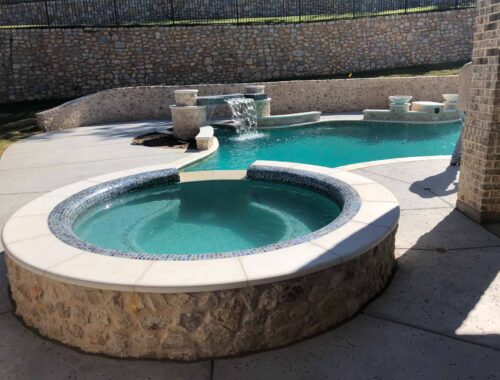
23 Aug The Various Types Of Pool Materials And Their Pros And Cons
When choosing a material for your swimming pool, it’s essential to understand the advantages and disadvantages of each option. The material you select will impact the pool’s appearance, durability, maintenance needs, and overall cost. Here’s a detailed overview of the various types of pool materials, including their pros and cons:
1. Concrete (Gunite) Pools
Pros:
1.1. Customizable Design:
Unlimited Shapes and Sizes: Concrete pools can be built in any shape or size, allowing for extensive customization.
Integration of Features: Easily incorporate waterfalls, spas, and custom tiling features.
1.2. Durability:
Strong and Resilient: Concrete pools have a robust structure that can withstand severe weather conditions and heavy usage.
Long Lifespan: Concrete pools can last several decades with proper maintenance.
1.3. Variety of Finishes:
Surface Options: Choose from plaster, pebble, or tile finishes to achieve your desired look and feel.
Cons:
1.1. Higher Maintenance:
Porous Surface: The rough texture of concrete can harbor algae and require regular cleaning and maintenance.
Resurfacing Needs: Over time, the pool surface may need to be resurfaced or repaired, leading to additional costs.
1.2. Longer Installation Time:
Construction Process: Building a concrete pool involves a lengthy construction process, often taking several months to complete.
Weather Dependency: Construction timelines can be affected by weather conditions.
1.3. Higher Initial Cost:
Expensive Installation: The cost of installing a concrete pool is generally higher due to the extensive labor and materials involved.
2. Fiberglass Pools
Pros:
2.1. Low Maintenance:
Smooth Surface: The non-porous surface of fiberglass pools resists algae and staining, making them easier to clean.
Reduced Chemical Use: The smooth surface requires fewer chemicals to maintain water balance.
2.2. Quick Installation:
Pre-Fabricated: Fiberglass pools come pre-fabricated and are installed as a single piece, leading to a faster installation process.
Minimal Construction Time: Installation typically takes a few weeks.
2.3. Durability:
Flexible Material: Fiberglass can flex with ground movement and minor impacts without cracking.
Long Lifespan: These pools are durable and can last decades with proper care.
Cons:
2.1. Limited Customization:
Design Constraints: Fiberglass pools come in pre-designed shapes and sizes, which may limit customization options.
Size Restrictions: There are constraints on the maximum size and depth due to transportation and installation limitations.
2.2. Higher Upfront Cost:
Initial Expense: The cost of a fiberglass pool can be higher than that of some other pool types, though this may be offset by lower maintenance and energy costs.
2.3. Potential for Damage:
Impact Sensitivity: Fiberglass can be susceptible to damage from sharp objects or heavy impacts.
3. Vinyl Liner Pools
Pros:
3.1. Customizable Design:
Shape Flexibility: Vinyl liner pools can be custom-built in various shapes and sizes, allowing for a high degree of design flexibility.
Variety of Patterns: Choose from numerous liner patterns and colors to suit your aesthetic preferences.
3.2. Lower Initial Cost:
Affordable: Vinyl liner pools generally have a lower upfront cost compared to concrete and fiberglass pools.
3.3. Smooth Surface:
Comfortable: The smooth surface of vinyl liners is gentle on the skin and resists algae growth to some extent.
Cons:
3.1. Higher Maintenance and Replacement Costs:
Liner Replacement: Depending on usage and maintenance, the vinyl liner may need to be replaced every 7-15 years.
Surface Repairs: Liners can be prone to tears or punctures, requiring repairs or replacement.
3.2. Less Durability:
Surface Wear: Vinyl liners are less durable than concrete or fiberglass and can be affected by sharp objects or harsh chemicals.
Temperature Sensitivity: Extreme temperatures can cause the vinyl liner to become brittle or warp.
3.3. Installation Process:
Preparation Required: Proper site preparation and liner installation are crucial to avoid wrinkles and ensure a smooth fit.
4. Steel Pools
Pros:
4.1. Strong Structure:
Durable Framework: Steel pools have a robust framework that provides structural integrity and stability.
Customizable: Steel panels can be used to create various shapes and sizes.
4.2. Fast Installation:
Pre-Fabricated Panels: Steel pools use pre-fabricated panels to speed up construction.
Cons:
4.1. Corrosion Risks:
Rust and Corrosion: Steel is susceptible to rust and corrosion, especially in areas with high humidity or improper maintenance.
Protective Coating: Regular maintenance and protective coatings are required to prevent rusting.
4.2. Limited Aesthetic Options:
Surface Choices: Steel pools are often finished with a vinyl liner, which can limit design options compared to concrete or fiberglass.
4.3. Higher Long-Term Maintenance:
Rust Prevention: Ongoing maintenance to prevent rust can add to the long-term costs.
Summary
Concrete (Gunite) Pools:
Pros: Customizable design, durable, variety of finishes.
Cons: Higher maintenance, longer installation time, higher initial cost.
Fiberglass Pools:
Pros: Low maintenance, quick installation, and durability.
Cons: Limited customization, higher upfront cost, and potential impact damage.


